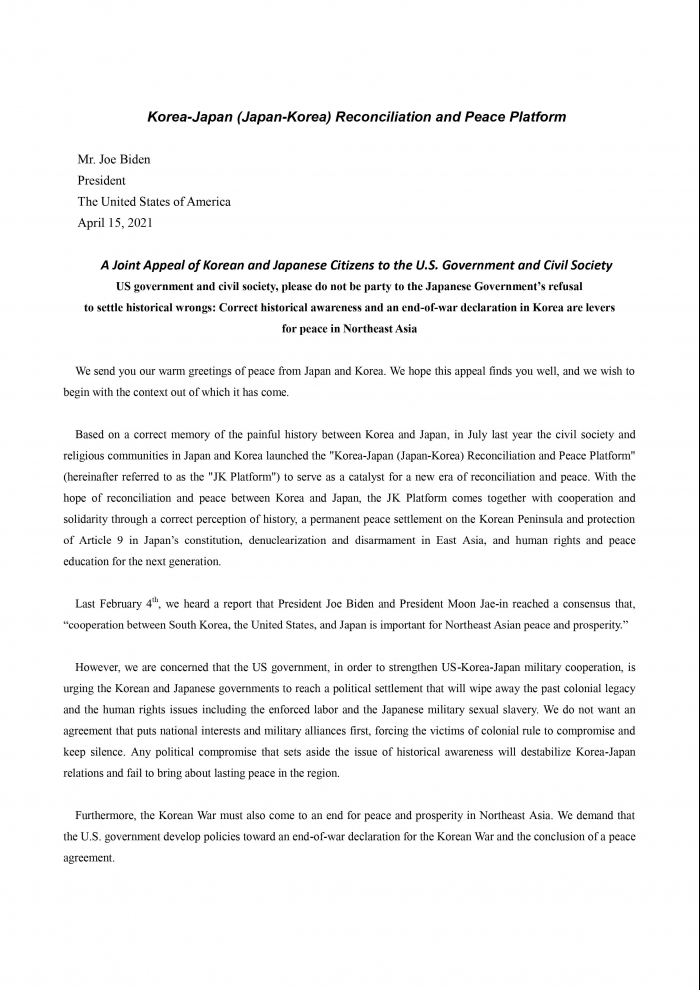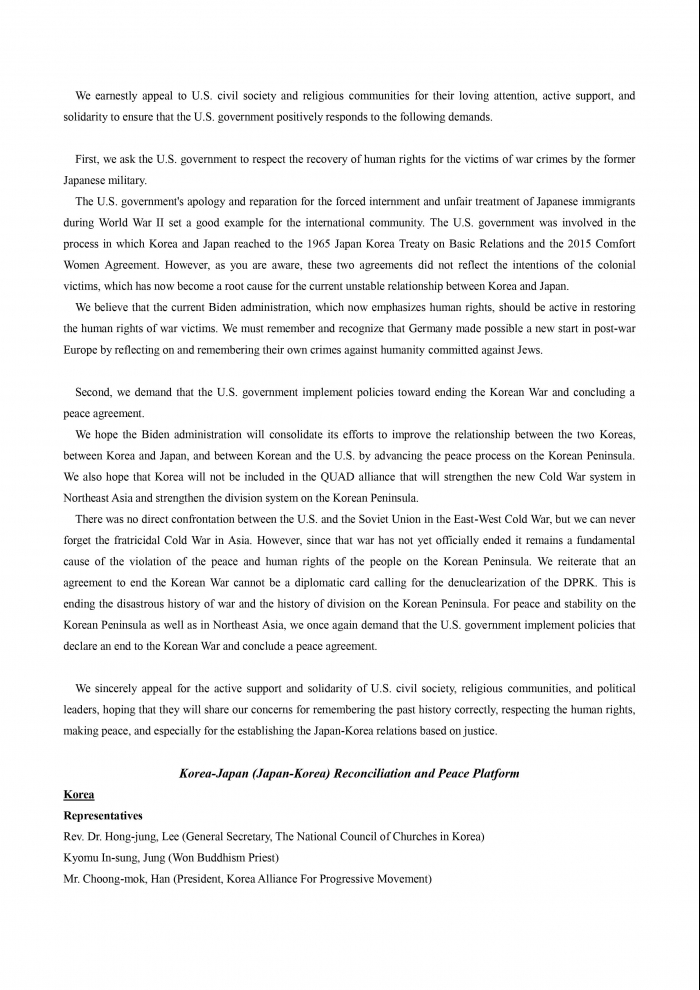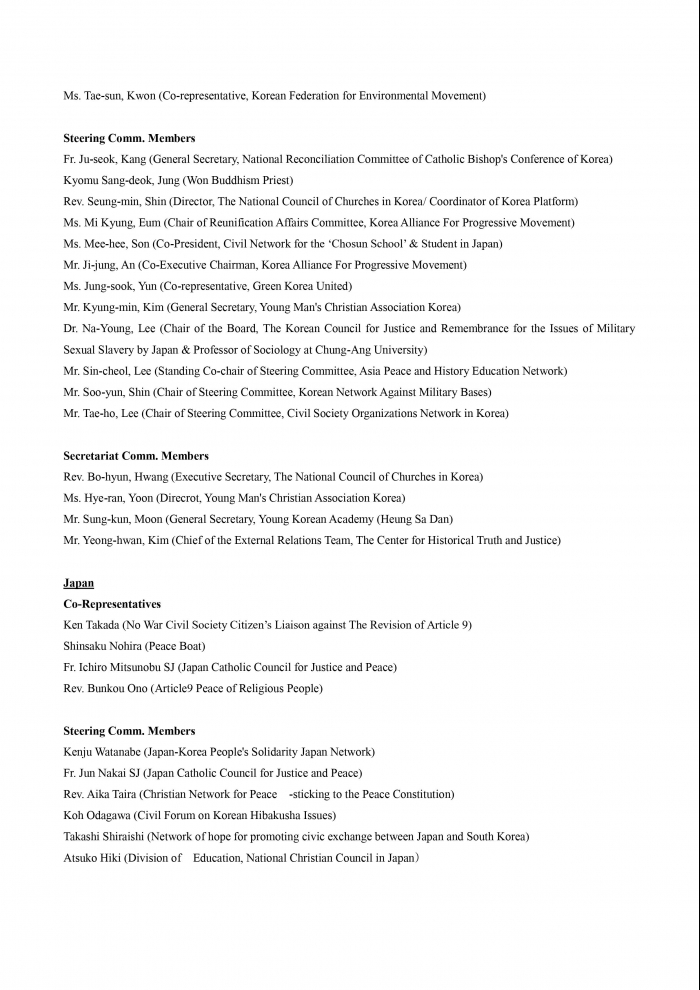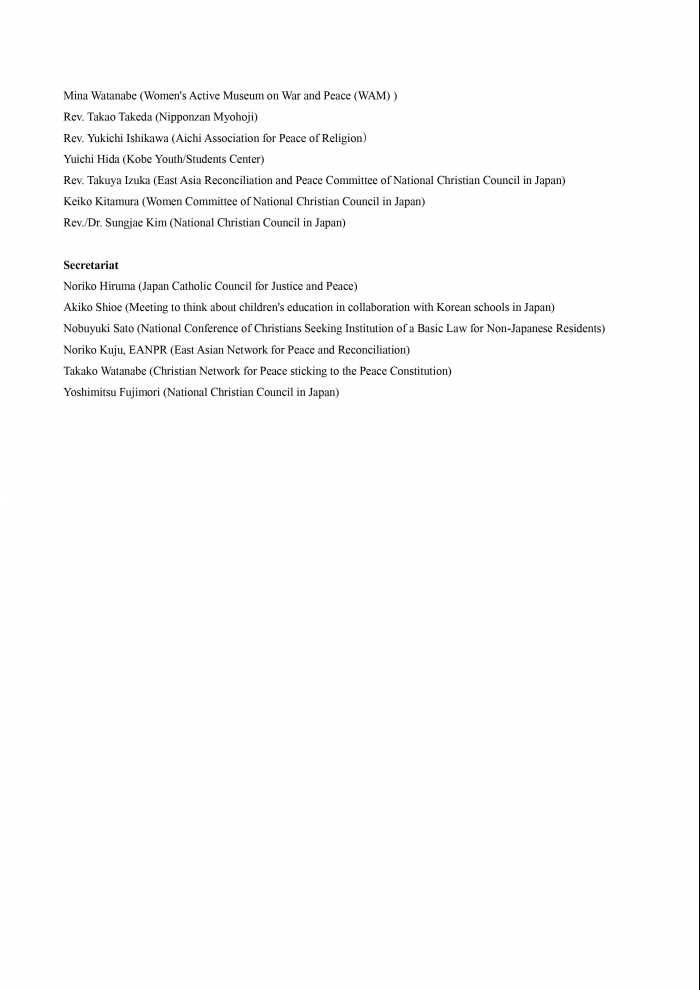



Korea-Japan (Japan-Korea) Reconciliation and Peace Platform
To:
Mr. Joe Biden
President
The United States of America
April 15, 2021
We send you our warm greetings of peace from Japan and Korea. We hope this appeal finds you well, and we wish to begin with the context out of which it has come.
Based on a correct memory of the painful history between Korea and Japan, in July last year the civil society and religious communities in Japan and Korea launched the "Korea-Japan (Japan-Korea) Reconciliation and Peace Platform" (hereinafter referred to as the "JK Platform") to serve as a catalyst for a new era of reconciliation and peace. With the hope of reconciliation and peace between Korea and Japan, the JK Platform comes together with cooperation and solidarity through a correct perception of history, a permanent peace settlement on the Korean Peninsula and protection of Article 9 in Japan’s constitution, denuclearization and disarmament in East Asia, and human rights and peace education for the next generation.
Last February 4th, we heard a report that President Joe Biden and President Moon Jae-in reached a consensus that, “cooperation between South Korea, the United States, and Japan is important for Northeast Asian peace and prosperity.”
However, we are concerned that the US government, in order to strengthen US-Korea-Japan military cooperation, is urging the Korean and Japanese governments to reach a political settlement that will wipe away the past colonial legacy and the human rights issues including the enforced labor and the Japanese military sexual slavery. We do not want an agreement that puts national interests and military alliances first, forcing the victims of colonial rule to compromise and keep silence. Any political compromise that sets aside the issue of historical awareness will destabilize Korea-Japan relations and fail to bring about lasting peace in the region.
Furthermore, the Korean War must also come to an end for peace and prosperity in Northeast Asia. We demand that the U.S. government develop policies toward an end-of-war declaration for the Korean War and the conclusion of a peace agreement.
We earnestly appeal to U.S. civil society and religious communities for their loving attention, active support, and solidarity to ensure that the U.S. government positively responds to the following demands.
First, we ask the U.S. government to respect the recovery of human rights for the victims of war crimes by the former Japanese military.
The U.S. government's apology and reparation for the forced internment and unfair treatment of Japanese immigrants during World War II set a good example for the international community. The U.S. government was involved in the process in which Korea and Japan reached to the 1965 Japan Korea Treaty on Basic Relations and the 2015 Comfort Women Agreement. However, as you are aware, these two agreements did not reflect the intentions of the colonial victims, which has now become a root cause for the current unstable relationship between Korea and Japan.
We believe that the current Biden administration, which now emphasizes human rights, should be active in restoring the human rights of war victims. We must remember and recognize that Germany made possible a new start in post-war Europe by reflecting on and remembering their own crimes against humanity committed against Jews.
Second, we demand that the U.S. government implement policies toward ending the Korean War and concluding a peace agreement.
We hope the Biden administration will consolidate its efforts to improve the relationship between the two Koreas, between Korea and Japan, and between Korean and the U.S. by advancing the peace process on the Korean Peninsula. We also hope that Korea will not be included in the QUAD alliance that will strengthen the new Cold War system in Northeast Asia and strengthen the division system on the Korean Peninsula.
There was no direct confrontation between the U.S. and the Soviet Union in the East-West Cold War, but we can never forget the fratricidal Cold War in Asia. However, since that war has not yet officially ended it remains a fundamental cause of the violation of the peace and human rights of the people on the Korean Peninsula. We reiterate that an agreement to end the Korean War cannot be a diplomatic card calling for the denuclearization of the DPRK. This is ending the disastrous history of war and the history of division on the Korean Peninsula. For peace and stability on the Korean Peninsula as well as in Northeast Asia, we once again demand that the U.S. government implement policies that declare an end to the Korean War and conclude a peace agreement.
We sincerely appeal for the active support and solidarity of U.S. civil society, religious communities, and political leaders, hoping that they will share our concerns for remembering the past history correctly, respecting the human rights, making peace, and especially for the establishing the Japan-Korea relations based on justice.
Korea-Japan (Japan-Korea) Reconciliation and Peace Platform
Korea
Representatives
Rev. Dr. Hong-jung, Lee (General Secretary, The National Council of Churches in Korea)
Kyomu In-sung, Jung (Won Buddhism Priest)
Mr. Choong-mok, Han (President, Korea Alliance For Progressive Movement)
Ms. Tae-sun, Kwon (Co-representative, Korean Federation for Environmental Movement)
Steering Comm. Members
Fr. Ju-seok, Kang (General Secretary, National Reconciliation Committee of Catholic Bishop's Conference of Korea)
Kyomu Sang-deok, Jung (Won Buddhism Priest)
Rev. Seung-min, Shin (Director, The National Council of Churches in Korea/ Coordinator of Korea Platform)
Ms. Mi Kyung, Eum (Chair of Reunification Affairs Committee, Korea Alliance For Progressive Movement)
Ms. Mee-hee, Son (Co-President, Civil Network for the ‘Chosun School’ & Student in Japan)
Mr. Ji-jung, An (Co-Executive Chairman, Korea Alliance For Progressive Movement)
Ms. Jung-sook, Yun (Co-representative, Green Korea United)
Mr. Kyung-min, Kim (General Secretary, Young Man's Christian Association Korea)
Dr. Na-Young, Lee (Chair of the Board, The Korean Council for Justice and Remembrance for the Issues of Military Sexual Slavery by Japan & Professor of Sociology at Chung-Ang University)
Mr. Sin-cheol, Lee (Standing Co-chair of Steering Committee, Asia Peace and History Education Network)
Mr. Soo-yun, Shin (Chair of Steering Committee, Korean Network Against Military Bases)
Mr. Tae-ho, Lee (Chair of Steering Committee, Civil Society Organizations Network in Korea)
Secretariat Comm. Members
Rev. Bo-hyun, Hwang (Executive Secretary, The National Council of Churches in Korea)
Ms. Hye-ran, Yoon (Direcrot, Young Man's Christian Association Korea)
Mr. Sung-kun, Moon (General Secretary, Young Korean Academy (Heung Sa Dan)
Mr. Yeong-hwan, Kim (Chief of the External Relations Team, The Center for Historical Truth and Justice)
Japan
Co-Representatives
Ken Takada (No War Civil Society Citizen’s Liaison against The Revision of Article 9)
Shinsaku Nohira (Peace Boat)
Fr. Ichiro Mitsunobu SJ (Japan Catholic Council for Justice and Peace)
Rev. Bunkou Ono (Article9 Peace of Religious People)
Steering Comm. Members
Kenju Watanabe (Japan-Korea People's Solidarity Japan Network)
Fr. Jun Nakai SJ (Japan Catholic Council for Justice and Peace)
Rev. Aika Taira (Christian Network for Peace -sticking to the Peace Constitution)
Koh Odagawa (Civil Forum on Korean Hibakusha Issues)
Takashi Shiraishi (Network of hope for promoting civic exchange between Japan and South Korea)
Atsuko Hiki (Division of Education, National Christian Council in Japan)
Mina Watanabe (Women's Active Museum on War and Peace (WAM) )
Rev. Takao Takeda (Nipponzan Myohoji)
Rev. Yukichi Ishikawa (Aichi Association for Peace of Religion)
Yuichi Hida (Kobe Youth/Students Center)
Rev. Takuya Izuka (East Asia Reconciliation and Peace Committee of National Christian Council in Japan)
Keiko Kitamura (Women Committee of National Christian Council in Japan)
Rev./Dr. Sungjae Kim (National Christian Council in Japan)
Secretariat
Noriko Hiruma (Japan Catholic Council for Justice and Peace)
Akiko Shioe (Meeting to think about children's education in collaboration with Korean schools in Japan)
Nobuyuki Sato (National Conference of Christians Seeking Institution of a Basic Law for Non-Japanese Residents)
Noriko Kuju, EANPR (East Asian Network for Peace and Reconciliation)
Takako Watanabe (Christian Network for Peace sticking to the Peace Constitution)
Yoshimitsu Fujimori (National Christian Council in Japan)


